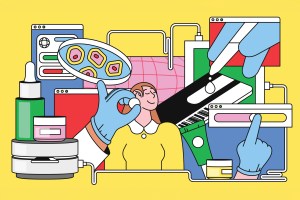From AI to aerospace: Europe’s most innovative companies shaping tomorrow
What does innovation look like in 2025? From AI to blockbuster weight-loss drugs, Europe’s forward-thinking companies punch above their weight.
For the first time, Fortune analyzed the top companies across the continent in partnership with Statista to find the standouts that are driving progress with success. Patent data was provided by LexisNexis Intellectual Property Solutions.
The list features 300 companies across 21 countries and 16 industries, and a total of 168 of the companies are on the Fortune 500 Europe. Companies on the list have brought in just under $8 trillion in annual revenue. The U.K. has more companies on our list than any other country, followed by Germany and Switzerland. The top sectors are finance, followed by retail and industrials.
Companies on the list have brought in just under $8 trillion in annual revenue.
The list features 300 companies across 21 countries and 16 industries, and a total of 168 of the companies are on the Fortune 500 Europe. Companies on the list have brought in just under $8 trillion in annual revenue. The U.K. has more companies on our list than any other country, followed by Germany and Switzerland. The top sectors are finance, followed by retail and industrials.
L’Oréal was ranked at the top of the list in 2025. “We are immensely proud to be recognized by Fortune as Europe’s most innovative company,” Nicolas Hieronimus, Chief Executive Officer of L’Oréal told Fortune. “This prestigious recognition reinforces our conviction that innovation, fueled by science, technology, and creativity, is the best way to succeed on the world stage, but is also a testament to the incredible talent and dedication of our teams around the globe.”
We’ve highlighted some of the standout companies from this year’s list driving innovation across Europe.
L’Oréal
Household products
Noted for: Product innovation
Employees: 50,000–99,999
Fortune 500 Europe rank: 91
France
L’Oréal invests more than €1 billion annually in research and innovation and boasts a team of over 4,000 researchers. This, in turn, helps the French company formulate new ingredients and develop new products. Earlier this year, L’Oréal launched a device called Cell BioPrint that will give people a detailed assessment of their skin and the products best suited for it.
“This prestigious recognition reinforces our conviction that innovation, fueled by science, technology, and creativity, is the best way to succeed on the world stage…”
Nicolas Hieronimus, CEO, L’Oréal
Unilever
Household products
Product innovation
Employees: >100,000
F500 Europe rank: 49
U.K.
Unilever’s innovations take different shapes and forms—from fast-action laundry liquid to paper-cup instant noodles. The London-based company has 20,000 patents and a team of 5,000 experts who design new products, aided by nearly €1 billion in annual investments. Unilever has also expanded its AI use to help customers find the best products and discover new ones backed by scientific data.
Philips
Health care
Product innovation
Employees: 50,000–99,999
F500 Europe rank: 210
Netherlands
Founded in 1891, Royal Philips is known for pioneering innovations in lighting, health care, and consumer electronics. Key breakthroughs include the first compact audio cassette, electric razors, and mercury-free light bulbs. Today, Philips leads in sustainable, health–focused technology, improving billions of lives globally.

GSK
Health care
Innovation culture
Employees: 50,000–99,999
F500 Europe rank: 104
U.K.
GSK’s innovations were reflected in its bottom line in 2024. With the help of its Silicon Valley veteran technology chief, Shobie Ramakrishnan, GSK is also using AI to speed drug discovery and streamline its supply chains.
Novo Nordisk
Health care
Innovation culture
Employees: 50,000–99,999
F500 Europe rank: 116
Denmark
Novo Nordisk is wasting little time in developing new obesity treatments that, until recently, made it Europe’s most valuable company. In May, the FDA accepted Novo’s application to sell an oral version of Wegovy; an approval decision is expected in Q4. Novo Nordisk’s recent trials for CagriSema, a new, more effective weight-loss medication, could increase its appeal beyond the millions already using its drugs.

Medtronic
Health care
Process innovation
Employees: 50,000–99,999
F500 Europe rank: 125
Ireland
In 2024, Medtronic invested more than $2.7 billion in R&D and operated over 81 manufacturing sites. AI is used to customize patient care, ranging from personalized brain therapy to data-driven diabetes care. The use of robotic-assisted surgery (RAS) also helps enhance precision and control.
EssilorLuxottica
Retailing
Product innovation
Employees: >100,000
F500 Europe rank: 144
France
Whether with Ray-Ban Meta glasses or its latest audio-enhancing eyewear, EssilorLuxottica is always pioneering new technology. Nearly 1,000 researchers across 50 R&D sites supported by up to €350 million in investment help the Franco-Italian company stay ahead of trends. The company is also vertically integrated, allowing for better quality control globally.
Click here to view the full list.
This story was originally featured on Fortune.com


© Illustration by Linn Fritz


